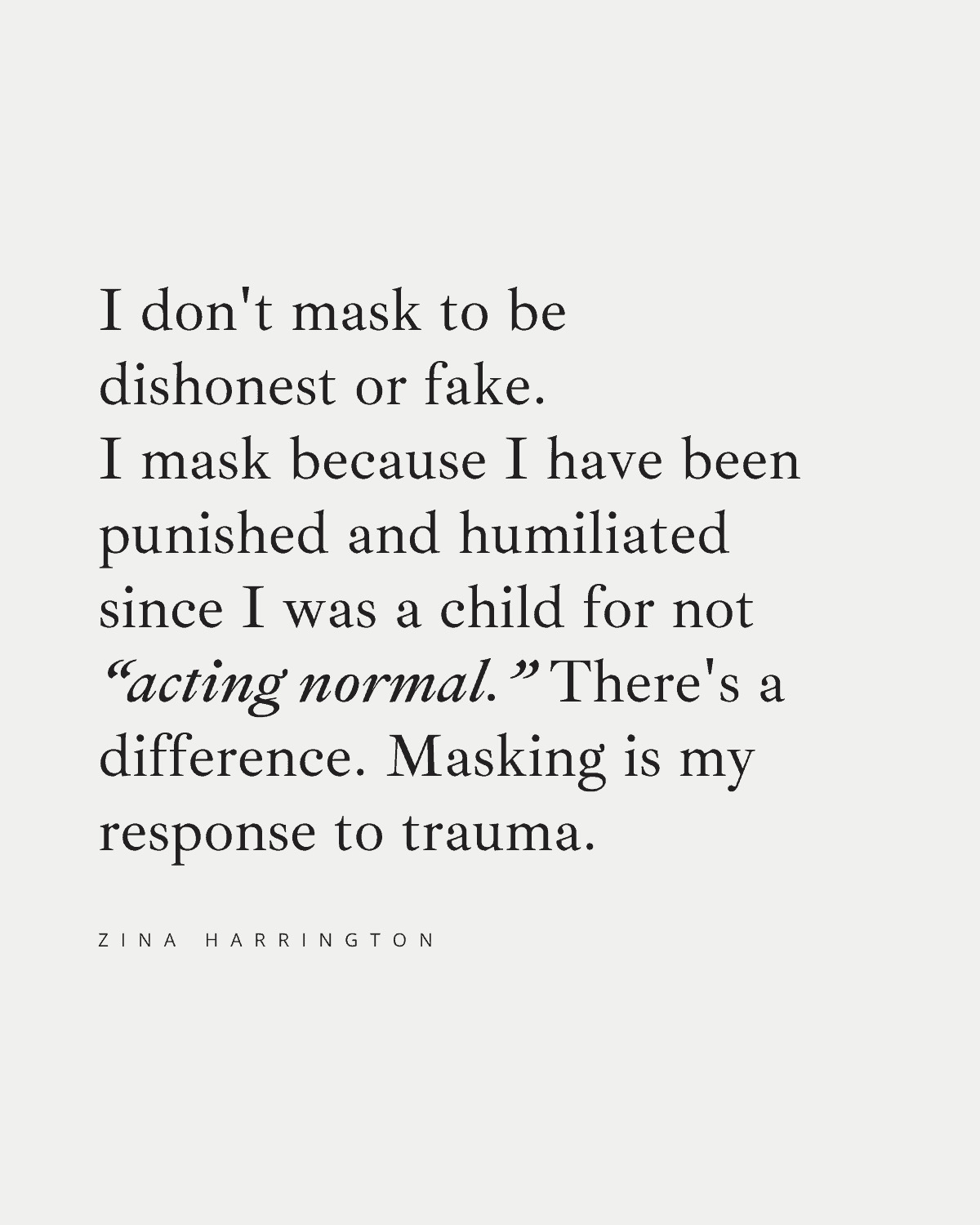Masking is not just a social adaptation; it's a silent, energy-consuming endeavor that often goes unnoticed. Here's why you might mask, along with thirty examples.

For neurobusy women, the practice of masking is not just a social adaptation; it's a silent, energy-consuming endeavor that often goes unnoticed by the outside world. The intricate dance of constantly adjusting, suppressing authenticity, managing cognitive load, and navigating emotional dissonance places a significant burden on the shoulders of neurobusy women.
Why This Is The Best Resource
- We'll define neurobusy masking and provide examples of everyday actions you might not realize are associated.
- We'll explain why masking is exhausting, shedding light on the factors contributing to the overwhelming exhaustion you've been feeling.
- We'll discuss the hidden dangers that can affect your well-being.
- Last, we'll explore steps for practicing unmasking and how it can help you move toward an authentic, unbusy life.
In a rush? Jump to the section of your choice or scroll to the very bottom for a quick summary of key points!
What is Masking?
Masking refers to the complex process of camouflaging or "impression management" to align with societal norms and expectations.
You may feel as if you cannot be yourself, so you mask and turn into someone else. Many neurobusy women mask their struggles to prevent them from interfering with their relationships and social life.
Keep in mind that masking does not mean you're fake or disingenuous. It's a subconscious learned response based on what is considered "normal."
Neurobusy people may be ashamed to admit they are faking it at times, but this phenomenon is more common than you know.
While the concept of masking may be new to you, the experience is often a familiar narrative for many neurobusy women.
DIVE DEEPER
30 Neurobusy Masking Examples
Neurobusy masking is a way of hiding struggles through learned behaviors that can be healthy or unhealthy. Many neurobusy women are distinct and may face shame for breaking norms or social rules. As a result, they develop coping strategies to hide parts of themselves.
Masking In Social Situations
If you are neurobusy, you may mask when interacting with people in the following ways:
- Constantly checking the time to avoid being late and appearing irresponsible.
- Engaging in overcompensatory behaviors, such as excessive nodding, to mask inattentiveness.
- Avoiding eye contact to prevent revealing distractibility during conversations.
- Using excessive self-deprecating humor to downplay forgetfulness or disorganization.
- Downplaying achievements to mask feelings of inadequacy or imposter syndrome
- Frequently apologizing for forgetfulness or missed details in conversations.
- Suppressing the impulse to share spontaneous ideas to avoid seeming overly impulsive.
- Employing adaptive body language to mask internal restlessness during meetings or gatherings.
- Utilizing humor as a deflection mechanism when feeling overwhelmed or anxious.
- Preferring solitary work to mitigate potential distractions in group settings.
- Downplaying achievements to mask feelings of inadequacy or imposter syndrome.
- Suppressing your physical anxiety to appear calm.
- Avoiding discussing personal challenges to maintain an outward appearance of competence.
- Developing elaborate systems for routine tasks to offset forgetfulness.
- Avoiding expressing genuine excitement or enthusiasm to prevent standing out.
- Regularly rehearsing social responses in advance to navigate conversations smoothly.
- Staying silent in conversations or being extra cautious with your words.
- Regularly apologizing for forgetfulness or missed details in conversations.
- Engaging in overthinking and overplanning casual conversations to avoid communication mishaps.
- Being extra early to avoid being late.
- Engaging in overcompensatory behaviors, such as excessive nodding, to mask inattentiveness.
- Refraining from asking for help to maintain an appearance of self-sufficiency.
- Focusing on external stimuli during conversations to appear engaged while battling internal distractions.
- Suppressing impulses to interrupt others by physically biting the tongue or lip.
- Pretending to remember details in ongoing discussions.
- Downplaying sensory sensitivities to light or noise to fit in socially, even when uncomfortable.
- Utilizing coping mechanisms like doodling or tapping to manage restlessness discreetly.
- Overthinking and overplanning casual conversations to avoid communication mishaps.
- Purposefully saying less to avoid talking too much or interrupting people.
- Avoiding sharing personal challenges with friends or family to prevent burdening them with concerns

Private Masking Habits
If you are neurobusy, you may also have everyday solo habits or preferences that are actually attempts to mask proactively:
- Crafting meticulous to-do lists as a compensatory strategy for struggles with time management.
- Limiting social interactions to prevent overstimulation and mental exhaustion.
- Creating elaborate systems for routine tasks or obsessively checking belongs to compensate for forgetfulness.
- Engaging in excessive self-monitoring to avoid appearing scattered or disorganized.
- Choosing solitary activities to avoid the potential stress of coordinating group events.
- Utilizing headphones or earplugs to minimize sensory overload in noisy environments.
- Preferring written communication over verbal to have more control over expression
Why Neurobusy Masking Is Exhausting
The act of masking for neurobusy women is a demanding and energy-intensive process. Several factors contribute to this exhaustion, including:
- Constant Vigilance: You are constantly alert — overprocessing and interpreting social cues, gestures, and expressions. The subconscious monitoring and adjusting of behavior is mentally and physically taxing.
- Suppressing Authenticity: The emotional toll of concealing one's true self to fit societal expectations is enormous.
- Heavy Cognitive Load: Masking requires intense cognitive processing and can feel like mental gymnastics, especially in demanding environments like the workplace or social gatherings.
- Emotional Dissonance: Neurobusy women may experience internal conflict, heightened stress, and emotional exhaustion as they grapple with the dissonance between their genuine emotions and the socially acceptable responses they feel compelled to display.
In unraveling the layers of why masking consumes so much energy for neurobusy women, you gain a deeper understanding of the struggles contributing to the overwhelming exhaustion you've been feeling.

Hidden Dangers of Neurobusy Masking
The dangers of masking for neurobusy women are profound, impacting not only your energy levels but also your emotional well-being and personal growth.
- Depleting Vital Energy Reserves: One of the dangers of constant masking is the significant depletion of energy reserves. Neurobusy women may find themselves using an extraordinary amount of energy to appear "fine." This excessive effort can lead to fatigue, burnout, and a lack of energy for the activities that truly bring joy and peace.
- Isolating Emotions and Support: Masking often involves hiding true feelings and emotions, denying oneself the emotional support crucial for mental well-being. By concealing struggles, neurobusy women may inadvertently isolate themselves from friends and family who could provide understanding and support. The internalization of emotions often leads to increased stress, anxiety, and a sense of loneliness.
- Creating False Perfection: If you are very good at masking your neurobusy struggles, people may not believe you when you tell them that something is wrong or that you are having a hard time.
- Straining Mental and Emotional Health: Masking replaces outward stress with internal stress. Suppressing authentic emotions to fit societal norms creates a dissonance that may contribute to heightened stress levels, anxiety, and, in severe cases, may lead to mental health challenges. The toll on emotional well-being becomes particularly pronounced as the gap between the projected image and inner reality widens.
- Impeding Personal Growth and Authenticity: Masking can even make it challenging for you to know what is real and what is an act. The fear of judgment or rejection often prevents neurobusy women from expressing their true selves and embracing their unique qualities. This inhibition can impede personal development and hinder the formation of genuine connections with others.
- Undermining Self-Acceptance: Constantly wearing a mask can undermine self-acceptance and perpetuate feelings of inadequacy. Neurobusy women may internalize societal expectations, leading to a distorted self-perception that can erode confidence and self-esteem. Embracing an intentional life becomes challenging when the subconscious focus is on conforming.
Recognizing masking is the first step neurobusy women can take toward an unbusy life where they thrive authentically.
How To Begin To Unmask
The delicate balance between fitting into societal expectations and expressing one's true self can be particularly challenging. Here are a few practical strategies for practicing unmasking.
- Acknowledge Your Experience: Begin the unmasking process by acknowledging you may be subconsciously masking.
- Identify Healthy & Harmful Masking: Reflect on which masking behaviors are healthy and which are hurting you. For example, learning to keep a reasonably tidy desk at work might be helpful, whereas needing everything to be perfect would be harmful.
- Reflect on Your Authentic Self: What aspects of your personality do you hide when masking? Take time to reflect on your authentic self — Consider the strengths, passions, and qualities that make you unique.
- Seek Support and Connection Find your people, the ones you feel genuinely comfortable being you. Make time to connect with people who bring out and appreciate your true self.
- Set Boundaries: Establish clear boundaries to protect your mental and emotional well-being. Understand when it's necessary to prioritize self-care and when to say no to additional commitments or social engagements that may contribute to overwhelm.
- Practice Mindfulness: Incorporate mindfulness practices into your daily routine to foster self-awareness and manage stress. Mindfulness can help you stay present in the moment, allowing for a more authentic expression of your thoughts and emotions.
- Gradual Exposure: Ease into unmasking by gradually exposing authentic elements of yourself in different settings. Start with environments where you feel more comfortable and gradually extend this authenticity to other aspects of your life.
- Celebrate Small Wins: Acknowledge and celebrate small victories along your unmasking journey. Whether it's expressing your true opinions in a meeting or sharing a personal story with a friend, recognizing these accomplishments reinforces the important inner work you are doing.
- Educate Others: Share information about being neurobusy with your close friends and family. Share the challenges you are facing with others, fostering understanding and support.
- Professional Guidance: Never underestimate the guidance of a well-researched mental health professional specializing in neurodivergent experiences. A professional can provide tailored strategies, support, and insights as you navigate the unmasking process.
Unmasking is an imperative step forward. Acknowledging your masking experiences and embracing your neurobusy identity is a huge step toward an intentional and authentic unbusy life.
Paving the Path To Your Authentic UnBusy Life
In the journey of becoming unbusy, unmasking is an imperative step for neurobusy women in the following ways.
- Relieving the Weight of Conformity: Unmasking is imperative, liberating you from the weight of conformity. Shed your mask and embrace your unapologetic self.
- Fostering Genuine Connections: Unmasking enables you to foster deeper and more meaningful relationships. Authenticity becomes the foundation for genuine bonds that go beyond surface-level interactions.
- Embracing Unique Strengths: Neurobusy individuals often possess unique strengths and perspectives. Unmasking opens doors to opportunities that align with your natural abilities.
- Cultivating Self-Acceptance: The process of unmasking is an essential component of cultivating self-acceptance. Embracing your neurobusy identity is the first step in breaking free of a cycle of self-criticism.
- Empowering Personal Growth: Unmasking is a catalyst for personal growth. It encourages you to explore and embrace hidden aspects of yourself, push boundaries, and move forward with intention. This empowerment contributes to a continual journey of evolution.
- Leading an Intentional Life: Unmasking paves the way for leading a more intentional and purposeful life. By shedding the layers of societal expectations, neurobusy women can align their actions and choices with their true values. Intentionally slow living fosters a sense of inner joy, creating a more peaceful and purpose-driven existence.
Liberating yourself from the confines of societal expectations, fostering genuine connections, embracing unique strengths, and cultivating self-acceptance are integral aspects of an intentionally unbusy life — a life rich with purpose, happiness, and the profound peace that comes from living authentically.
Key Points
- Masking is the intricate process of camouflaging, or "impression management," to conform to societal norms, where neurobusy individuals may hide their struggles to preserve relationships. It's a subconscious response and not indicative of being fake.
- Neurobusy masking involves concealing struggles through learned behaviors, with neurobusy women often facing shame for deviating from social norms, leading to the development of coping strategies.
- Masking for neurobusy women is a demanding process, involving constant vigilance, suppressing authenticity, handling a heavy cognitive load, and facing emotional dissonance, which collectively contributes to significant mental and physical exhaustion.
- The profound dangers of neurobusy masking encompass depleting vital energy reserves, isolating emotions and support, straining mental and emotional health, impeding personal growth and authenticity, and undermining self-acceptance.
- Navigating the delicate balance between societal norms and true self-expression can be challenging. Practical strategies for unmasking include acknowledging your experience, identifying healthy and harmful masking, reflecting on your authentic self, setting boundaries, practicing mindfulness, gradual exposure, and celebrating small wins.
- Breaking free from societal expectations, fostering genuine connections, cultivating self-acceptance, empowering personal growth, and being intentional are vital components of embracing an unbusy life—marked by purpose, happiness, and profound peace through authentic living.
Love this informative masking post? Sharing it would make our week ♥
It would make our week if you took a second to save or share this post. That’s how we know we’re on the right track and should continue writing more content like this!



